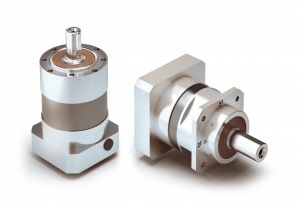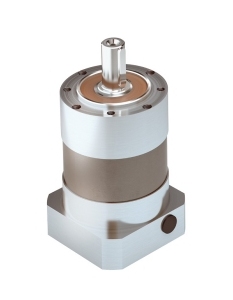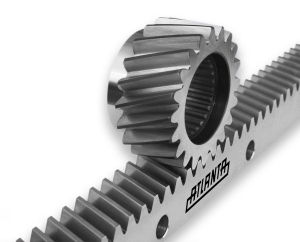Economy Planetary Reducers

This standard range of Economy Planetary Reducers are perfect for use in applications that demand good performance with an economical price level. Design features include standard low backlash, high power density, smooth operation and mounting any servo motors (IEC, NEMA).
They are available in five sizes with reduction ratios from 3:1 to 512:1 and output torque capacities up to 944 lb.ft. The output can be provided with a solid shaft with or without a keyway, for mounting to rotary or indexing tables, pinion gears, pulleys or other drive elements without the need for a coupling.
Typical applications for these reducers include rotary axis drives, material handling axis drives, packaging machines, conveyor systems and, labelling systems. Industries served include Material Handling, Packaging, Textile, Automation, Aerospace, Machine Tool and Robotics.
These units are also available with output pinions for use in rack & pinion drives. For more information, please contact us.
- Unit Ratings
- Unit Selection

The following table gives the technical specifications for the Economy Planetary Reducers with solid output shafts.
Service factors need to be applied to these ratings to make a proper selection.
| Unit Size |
Output Shaft Diameter |
Stages | Available Ratios |
Maximum Acceleration Torque (lb.ft.) |
Maximum Input Speed (rpm)* |
Torsional Backlash (arc-min) |
Efficiency (η) |
|---|---|---|---|---|---|---|---|
| 40 | 10 mm | 1 | 3:1 to 10:1 | 16 | 5,000 | < 15 | 98% |
| 2 | 9:1 to 64:1 | 23 | 5,000 | < 19 | 97% | ||
| 3 | 60:1 to 512:1 | 23 | 5,000 | < 22 | 92% | ||
| 60 | 14 mm | 1 | 3:1 to 10:1 | 47 | 6,000 | < 10 | 98% |
| 2 | 9:1 to 64:1 | 51 | 6,000 | < 12 | 97% | ||
| 3 | 60:1 to 512:1 | 51 | 6,000 | < 15 | 92% | ||
| 80 | 20 mm | 1 | 3:1 to 10:1 | 130 | 6,000 | < 7 | 98% |
| 2 | 9:1 to 64:1 | 141 | 6,000 | < 9 | 97% | ||
| 3 | 60:1 to 512:1 | 141 | 6,000 | < 11 | 92% | ||
| 120 | 25 mm | 1 | 3:1 to 10:1 | 230 | 5,000 | < 7 | 98% |
| 2 | 9:1 to 64:1 | 306 | 5,000 | < 9 | 97% | ||
| 3 | 60:1 to 512:1 | 306 | 5,000 | < 11 | 92% | ||
| 160 | 40 mm | 1 | 3:1 to 8:1 | 531 | 2,200 | < 6 | 98% |
| 2 | 12:1 to 64:1 | 944 | 3,000 | < 9 | 97% |
*Values for cyclic duty.
These reducers are typically selected based on the peak cycle forces, which usually happen during accelerations and decelerations. These cycle forces depend on the driven load, the speed vs. time profile for the cycle, and any other external forces acting on the axis.
For application & selection assistance, please call, fax or email us. Your application information will be reviewed by our engineers, who will recommend the best solution for your application.
